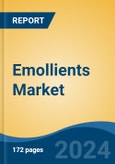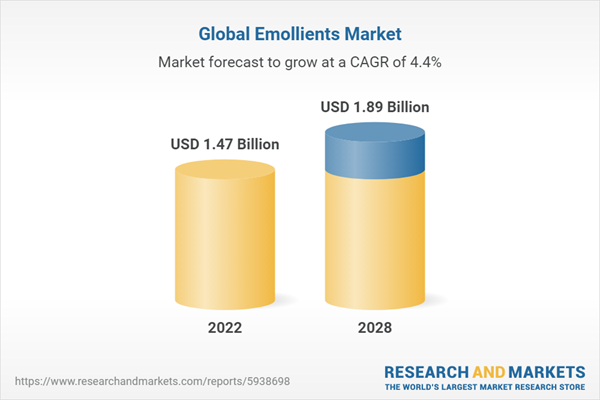Speak directly to the analyst to clarify any post sales queries you may have.
10% Free customizationThis report comes with 10% free customization, enabling you to add data that meets your specific business needs.
Furthermore, within the emollients market, the personal care segment has also been experiencing significant expansion. Despite the unprecedented disruptions caused by the COVID-19 pandemic, this segment has managed to thrive and is projected to witness even more remarkable growth in the foreseeable future. Emollients play an integral role in the formulation of products such as shampoos, conditioners, and body cleansers, catering to consumers' desires for soft, smooth skin and lustrous hair.
Another prominent driving factor for the emollients market is the escalating demand for natural and organic beauty products. As consumers become increasingly conscious of the ingredients present in their skincare products, there has been a surge in demand for natural emollients. This shift towards organic and sustainable beauty solutions has paved the way for innovative trends in the market, shaping the preferences and choices of consumers.
In conclusion, the global emollients market is currently on a promising upward trajectory, propelled by factors such as heightened consumer awareness, the rapid growth of the cosmetics industry, and the soaring demand for natural and organic products. As these compelling trends continue to shape the market landscape, the emollients market is poised to reach new heights of success and expansion in the coming years, presenting a plethora of opportunities for industry players and stakeholders alike.
Key Market Drivers
Growing Demand of Emollients in Cosmetic Industry
Emollients are well-known for their exceptional moisturizing, softening, and skin-improving properties. These remarkable substances work by creating a protective oily layer on the skin's surface, effectively sealing in moisture and leaving the skin looking smooth, supple, and thoroughly hydrated. It is this unique attribute that has made emollients an indispensable component in a wide range of cosmetic products, including creams, lotions, ointments, and makeup.When it comes to makeup, emollients play a vital role in enhancing the product's texture, spreadability, and longevity. In skincare, they provide essential hydration, imparting a plump and youthful appearance while helping to diminish the visible signs of aging, such as fine lines and wrinkles.
Today's consumers are more knowledgeable and discerning than ever before, actively seeking out products with specific benefits that cater to their individual needs. This growing demand for emollient-rich cosmetics has resulted in a surge in popularity. Additionally, the increasing preference for natural and organic beauty products has also had a significant influence on the emollients market, with consumers increasingly gravitating towards plant-based and sustainable alternatives.
As the cosmetic industry continues to evolve and innovate, emollients remain at the forefront of this progress. Manufacturers are heavily investing in research and development to create new formulations that deliver superior benefits. One notable trend is the rise of multifunctional emollients, which not only provide moisturization but also offer additional advantages, such as UV protection.
The future looks exceptionally promising for the role of emollients in the cosmetics industry. With consumers consistently prioritizing skincare and beauty, the demand for products enriched with high-quality emollients is projected to grow exponentially. Furthermore, as the natural and sustainable beauty movement gains further traction, the market for plant-based and eco-friendly emollients is poised for substantial expansion.
Surge in Technological Advancements
Technological advancements have significantly revolutionized the formulation of emollients. In the past, emollients were primarily simple substances that provided basic softening and moisturizing properties to the skin. However, with the advent of modern technology, the development of multifunctional emollients has become possible, bringing additional benefits such as UV protection and anti-aging properties.Moreover, the rise of nanotechnology has paved the way for the creation of nano-emulsions, which offer superior stability and increased bioavailability. These innovative nano-emulsions have not only improved the effectiveness of emollients but also expanded their application in various cosmetics and personal care products.
Furthermore, technological advancements have played a pivotal role in enhancing the production processes of emollients. Modern manufacturing techniques have greatly improved the scalability and efficiency of emollient production, effectively meeting the growing demand in the market.
In addition to production advancements, technology has also contributed to promoting sustainability within the emollients market. The development of plant-based and biodegradable emollients has been made possible through significant strides in green chemistry. This aligns perfectly with the rising consumer preference for natural and eco-friendly products, further driving the demand for emollients.
Another significant impact of technology on the emollients market lies in the realm of data analytics and forecasting. Advanced data analysis tools empower companies to gain valuable insights into market trends, consumer preferences, and competitive landscapes. This data-driven approach enables businesses to strategize effectively and seize market opportunities with confidence.
Key Market Challenges
Volatility in Price of Raw Materials
Raw material price volatility is a pervasive issue that affects numerous industries, including the emollients market. The fluctuating prices of raw materials, such as crude oil, which is a key component in the production of certain emollients, present a formidable challenge.The cost and availability of raw materials are subject to a multitude of factors, including supply disruptions, pent-up demand, trade restrictions, and significant peak and trough cycles. These factors can contribute to unpredictable price fluctuations, thereby making cost estimation and financial planning an arduous task for emollient manufacturers.
The ramifications of raw material price volatility are manifold. Firstly, it can substantially inflate the cost of production. Any increase in the price of raw materials directly impacts the cost of manufacturing emollients, which, in turn, can influence the pricing of the final product.
Furthermore, price volatility can disrupt supply chains, leading to production delays. This, in turn, can hinder manufacturers' ability to meet market demand in a timely manner, potentially resulting in lost sales and diminished market share.
In addition, price fluctuations can also have an impact on the quality of the product. In an attempt to mitigate rising costs, manufacturers may be tempted to compromise on the quality of raw materials, which can ultimately impair the efficacy of the emollients.
Key Market Trends
Growing Demand for Multi-Functional Emollients
In our fast-paced world, consumers are increasingly drawn to products that offer multiple benefits in a single application. This desire for multi-functionality has had a profound impact on the cosmetics and personal care industry. As a result, there has been a surge in demand for emollient-based personal care products that not only provide moisturization but also offer additional advantages.For instance, emollients that provide UV protection, anti-aging properties, or skin brightening effects have gained significant popularity. These multi-functional emollients allow consumers to streamline their beauty routines without sacrificing the benefits they seek. By incorporating these versatile emollients into their skincare regimen, individuals can enjoy the convenience of addressing multiple concerns with a single product.
Interestingly, the demand for multi-functional emollients is not confined to a particular region. It is a global trend, with the Asia-Pacific region showing a noteworthy increase in demand. This demonstrates that consumers worldwide are seeking emollient products that cater to their diverse skincare needs.
In conclusion, the growing demand for multi-functional emollients is a significant trend that is shaping the global emollients market. Manufacturers are continually innovating and developing new emollients that offer an array of benefits to meet this increasing demand. As a result, the emollients market is poised for robust growth in the coming years, driven by the ever-evolving needs and preferences of consumers.
Segmental Insights
Product Type Insights
Based on the category of product type, the isopropyl myristate segment emerged as the dominant player in the global market for emollients in 2022. Isopropyl Myristate, a widely utilized emollient, plays a crucial role in the production of topical medicinal preparations as well as specialty cosmetics that focus on combating dryness and enhancing skin care. With its versatility and effectiveness, this ingredient has become a staple in the formulation of various skincare products, providing nourishment and hydration to promote healthier and more radiant skin.Application Insights
The skincare segment is projected to experience rapid growth during the forecast period. The increasing use of skin care products, such as moisturizers, creams, and lotions, has contributed to the growth of the market. Consumers are becoming more conscious of their skincare routines, leading to a rising demand for effective personal care solutions. In response to this trend, the personal care industry is incorporating plant-based emollients into their products, further driving market growth. Manufacturers are now developing new and innovative products that utilize plant-based oils and ingredients to cater to the evolving needs of consumers.One such example is OrgaGlo, which recently entered the Indian market in August 2022. They introduced a range of 18 latest products, including hair care and skin care solutions, all formulated with plant-based ingredients. This expansion not only demonstrates the company's commitment to providing natural and effective personal care options but also highlights the growing popularity and acceptance of plant-based formulations in the industry.
Regional Insights
Asia Pacific emerged as the dominant player in the Global Emollients Market in 2022, holding the largest market share in terms of both value and volume. The region is projected to maintain its strong position in the market during the forecast period, owing to several factors. Firstly, the population of Asia accounts for nearly 60% of the world's total population, establishing it as the dominant majority. This substantial population provides a significant consumer base for various personal care products.Emollients, which are crucial ingredients in products like shampoos, conditioners, moisturizers, lotions, and deodorants, are expected to witness increasing demand in the region. The rising consumption of these personal care items in Asia is anticipated to drive the market further, creating lucrative opportunities for businesses operating in the industry.
Report Scope
In this report, the Global Emollients Market has been segmented into the following categories, in addition to the industry trends which have also been detailed below:Global Emollients Market, By Product Type:
- Isopropyl Myristate
- C12-15 Alkyl Benzoate
- Caprylic/Capric
- Triglyceride
- Cetyl Palmitate
- Myristyl Myristate
- Others
Global Emollients Market, By Application:
- Hair Care
- Cosmetics
- Oral Care
- Skincare
- Fragrances
- Toiletries
- Others
Global Emollients Market, By Region:
- North America
- United States
- Canada
- Mexico
- Europe
- France
- United Kingdom
- Italy
- Germany
- Spain
- Asia-Pacific
- China
- India
- Japan
- Australia
- South Korea
- South America
- Brazil
- Argentina
- Colombia
- Middle East & Africa
- South Africa
- Saudi Arabia
- UAE
Competitive Landscape
Company Profiles: Detailed analysis of the major companies present in the Global Emollients Market.Available Customizations:
The analyst offers customization according to specific needs, along with the already-given market data of the Global Emollients Market report.This product will be delivered within 1-3 business days.
Table of Contents
Companies Mentioned
- BASF SE
- Clariant AG
- Eastman Chemical Company
- The Lubrizol Corporation
- Covestro AG
- Evonik Industries AG
- HallStar Company
- Croda International Plc
- Ashland Inc.
- Lonza Group AG
Table Information
| Report Attribute | Details |
|---|---|
| No. of Pages | 172 |
| Published | January 2024 |
| Forecast Period | 2022 - 2028 |
| Estimated Market Value ( USD | $ 1.47 Billion |
| Forecasted Market Value ( USD | $ 1.89 Billion |
| Compound Annual Growth Rate | 4.4% |
| Regions Covered | Global |
| No. of Companies Mentioned | 10 |









